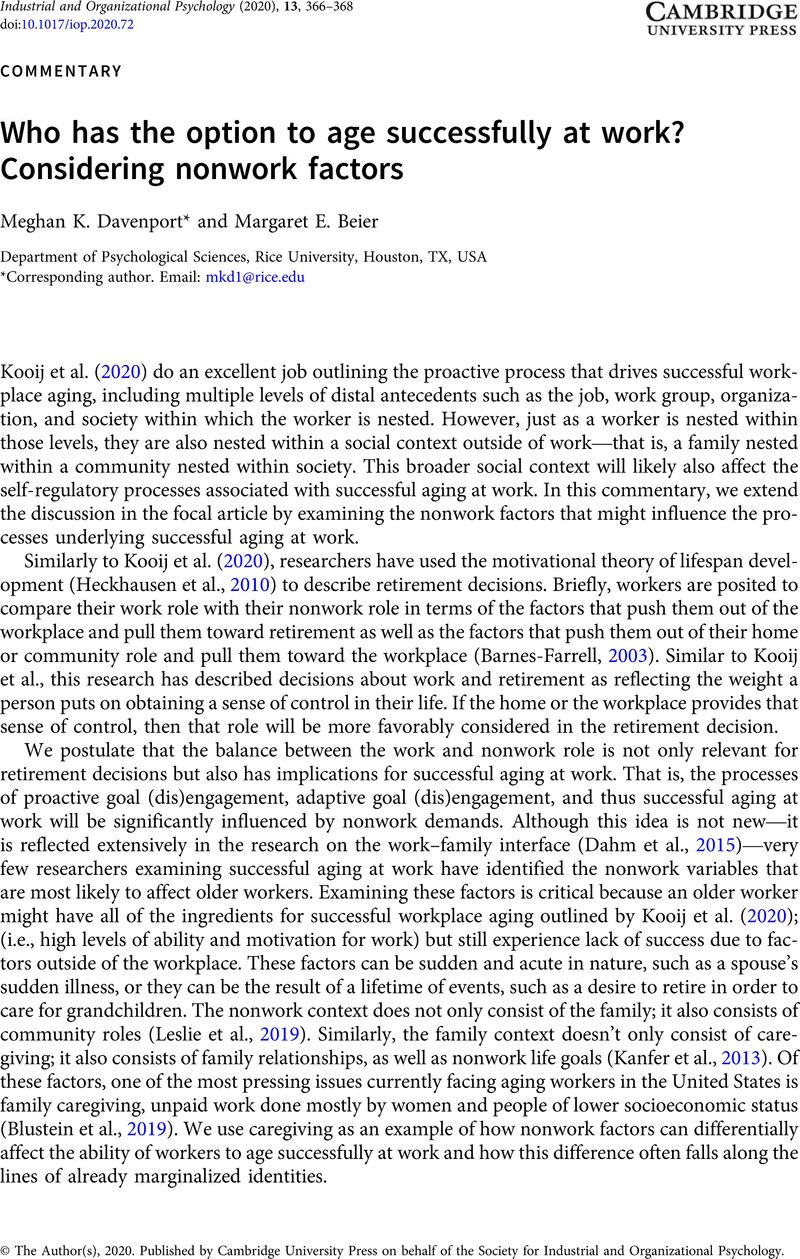No CrossRef data available.
Article contents
Who has the option to age successfully at work? Considering nonwork factors
Published online by Cambridge University Press: 11 November 2020
Abstract
An abstract is not available for this content so a preview has been provided. Please use the Get access link above for information on how to access this content.

- Type
- Commentaries
- Information
- Copyright
- © The Author(s), 2020. Published by Cambridge University Press on behalf of the Society for Industrial and Organizational Psychology.
References
Barnes-Farrell, J. L. (2003). Beyond health and wealth: Attitudinal and other influences on retirement decision-making. In Adams, G. A. & Beehr, T. A. (Eds.), Retirement: Reasons, processes, and results (pp. 159–187). Springer.Google Scholar
Barnett, R. C., & Hyde, J. S. (2001). Women, men, work, and family: An expansionist theory. American Psychologist, 56(10), 781–796. https://doi.org/10.1037/0003-066X.56.10.781
CrossRefGoogle Scholar
Blustein, D. L., Kenny, M. E., Di Fabio, A., & Guichard, J. (2019). Expanding the impact of the psychology of working: Engaging psychology in the struggle for decent work and human rights. Journal of Career Assessment, 27(1), 3–28. https://doi.org/10.1177/1069072718774002
CrossRefGoogle Scholar
Crenshaw, K. (1989). Demarginalizing the intersection of race and sex: A Black feminist critique of antidiscrimination doctrine, feminist theory and antiracist politics. University of Chicago Legal Forum, 1989(1), Article 8.Google Scholar
Dahm, P. C., Glomb, T. M., Manchester, C. F., & Leroy, S. (2015). Work–family conflict and self-discrepant time allocation at work. Journal of Applied Psychology, 100(3), 767–792.CrossRefGoogle ScholarPubMed
Fahle, S., & McGarry, K. (2018). Women working longer: Labor market implications of providing family care. In Goldin, C. & Katz, L. F. (Eds.), Women working longer: Increased employment at older ages (pp. 157–181). The University of Chicago Press.Google Scholar
Heckhausen, J., Wrosch, C., & Schulz, R. (2010). A motivational theory of life-span development. Psychological Review, 117, 32–60. https://doi.org/10.1037/a0017668
CrossRefGoogle ScholarPubMed
Henrich, J., Heine, S. J., & Norenzayan, A. (2010). The weirdest people in the world? Behavioral and Brain Sciences, 33(2–3), 61–83. https://doi.org/10.1017/S0140525X0999152X
CrossRefGoogle Scholar
Kanfer, R., Beier, M. E., & Ackerman, P. L. (2013). Goals and motivation related to work in later adulthood: An organizing framework. European Journal of Work and Organizational Psychology, 22(3), 253–264. https://doi.org/10.1080/1359432X.2012.734298
CrossRefGoogle Scholar
Kooij, D. T. A. M., Zacher, H., Wang, M., & Heckhausen, J. (2020). Successful aging at work: A process model to guide future research and practice. Industrial and Organizational Psychology: Perspectives on Science and Practice, 13(3), 345–365.Google Scholar
Leslie, L. M., King, E. B., & Clair, J. A. (2019). Work–life ideologies: The contextual basis and consequences of beliefs about work and life. Academy of Management Review, 44(1), 72–98. https://doi.org/10.5465/amr.2016.0410
CrossRefGoogle Scholar
Maestas, N. (2018). The return to work and women’s employment decisions. In Goldin, C. & Katz, L. F. (Eds.), Women working longer: Increased employment at older ages (pp. 55–83). The University of Chicago Press.Google Scholar
Stoiko, R. R. (2015). Familial caregiving and timing of retirement: A gendered cohort analysis [Doctoral dissertation, West Virginia University]. Graduate Theses, Dissertations, and Problem Reports. 6731. https://researchrepository.wvu.edu/etd/6731
Google Scholar
Zacher, H., & Winter, G. (2011). Eldercare demands, strain, and work engagement: The moderating role of perceived organizational support. Journal of Vocational Behavior, 79(3), 667–680. https://doi.org/10.1016/j.jvb.2011.03.020
CrossRefGoogle Scholar


